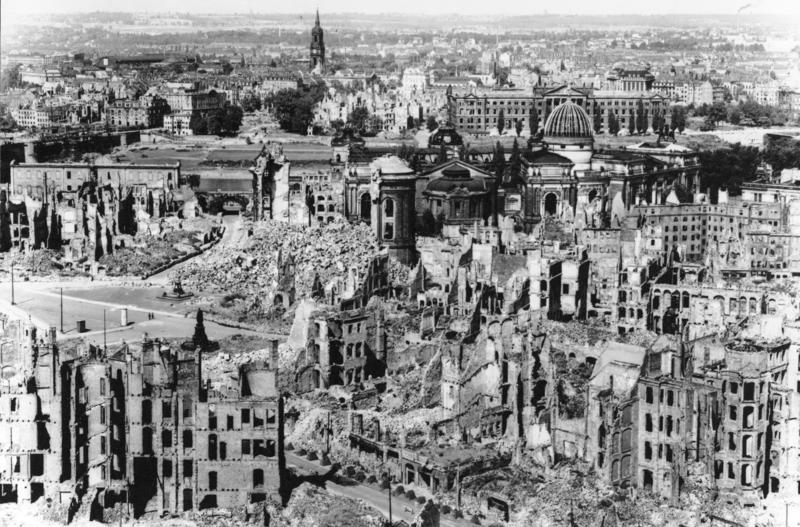A supporter of the German resistance, who carried the details of the plot to assassinate Hitler from Dietrich Bonhoeffer to the allies, Church of England Bishop George Bell spoke out against the carpet bombing of German cities.
He probably ruined his chances of becoming Archbishop of Canterbury, the head of his church. Still, he presents an enduring example of a Christian not surrendering to the implied binary of all-in support for either side of a war. His speech addressing the House of Lords in February 1944 – one of many of his protests against area bombing echoes loudly in the present.
The image with this story shows Dresden after the allied Bombing of February 13-15, 1945 – when a resultant firestorm destroyed more than 6.5 km2 of the city centre.[1] Up to 25,000 people were killed.
“DO THE Government understand the full force of what area bombardment is doing and is destroying now? Are they alive not only to the vastness of the material damage, much of which is irreparable but also to the harvest they are laying up for the future relationships of the peoples of Europe, as well as to its moral implications?
“I recognise the legitimacy of concentrated attack on industrial and military objectives, on airfields and air bases. I fully realise that in attacks on centres of war industry and transport, the killing of civilians, when it is the result of bona fide military activity, is inevitable. But there must be a fair balance between the means employed and the purpose achieved. To obliterate a whole town because certain portions contain military and industrial establishments is to reject the balance.
“Let me take two crucial instances, Hamburg and Berlin. Hamburg contains targets of immense military and industrial importance. It also happens to be the most democratic town in Germany, where the anti-Nazi opposition was strongest. Injuries to civilians resulting from bona fide attacks on particular objectives are legitimate according to International Law. But owing to the methods used, the whole town is now a ruin. Unutterable destruction and devastation were wrought last autumn. On a very conservative estimate, 28,000 persons were killed.
“Never before in the history of air warfare was an attack of such weight and persistence carried out against a single industrial concentration. Practically all the buildings, cultural, military, residential, industrial, religious – including the famous University Library with its 800,000 volumes, of which three-quarters have perished – were razed to the ground.
“Berlin is four times the size of Hamburg. The offices of the government, the military, industrial, war-making establishments in Berlin are a fair target. Injuries to civilians are inevitable. But, to date, half Berlin has been destroyed, the residential and the industrial portions alike.
“Through the dropping of thousands of tons of bombs of extraordinary power, men and women have been lost, overwhelmed in the colossal tornado of smoke, blast and flame. It is said that 74,000 persons have been killed and that 3 million are already homeless. The policy is obliteration, openly acknowledged. That is not a justifiable act of war.
…
“The sufferings of Europe, brought about by the demoniac cruelty of Hitler and his Nazis, and hardly imaginable to those in this country who for the last five years have not been out of this island or had intimate association with Hitler’s victims, are not to be healed by the use of power only. What we do in war – which, after all, lasts a comparatively short time – affects the whole character of peace, which covers a much longer period.
“It is of supreme importance that we who are the liberators of Europe should so use power that it is always under the control of law. For because the chief name inscribed on our banner is “Law”, the Allies stand for something greater than power.”
…
“I wish to offer a few concluding remarks on the policy as a whole. It will be said that this area bombing—for it is this area bombing which is the issue to-day—is definitely designed to diminish the sacrifice of British lives and to shorten the war. We all wish with all our hearts that these two objects could be achieved, but to justify methods inhumane in themselves by arguments of expediency smacks of the Nazi philosophy that Might is Right.”
This writer is not masquerading as a George Bell, who is regarded by many as an Anglican saint. (The current Archbishop of Canterbury, Justin Welby, has retracted his claim that there was a “significant cloud over Bell’s reputation following a child abuse allegation and plans to have a statue of him at Canterbury Cathedral are going ahead.)
Bells’s protests during WWII should encourage Christians that the fast-moving war in Gaza/Israel does not require us to be in lockstep with the actions of either Israel or Hamas.
This is not to imply a moral equivalence between Hamas and the Israeli Defence Forces.
To follw Bell’s example is not advocate a neutral stance. George Bell was resolutely anti-Nazi, acknowledging the legitimacy of an air war against the Nazis and co-operating with Bonhoeffer and the plotters to assassinate Hitler. But Bell was able to mount an effective critique of the Allies’ bombing effects against the lives of German civilians.
As our picture reveals, about a year after Bell gave his speech in the House of Lords in February 1944, Dresden was destroyed in a firestorm that did not distinguish between the legitimate military targets, such as Dresden’s railways close to the Eastern front, and the 25,000 who died over three nights of bombing.

